Omikron: The Nomad Soul

| a game by | Quantic Dream SA |
| Platform: | PC (1999) |
| User Rating: | 9.3/10 - 3 votes |
| Rate this game: | |
| See also: | Quest Games, Cyberpunk Games, Isekai Games |
Although more famous for the fact that you can find a digitised David Bowie in full Thai ladyboy mode dancing in one of the many bars that make up its gameworld, The Nomad Soul is also a damn good game. It's one of the most ambitious titles we've ever come across, with an epic sci-fi storyline, a massive world full of detail to explore and a combination of genres. It's an adventure, it's a first-person shooter, it's a beat 'em up and it's totally engrossing.
On top of all this, it's also a game intended solely for adults. You get to bed your girlfriend in the first few minutes and you visit sex shops and whore-houses every step of the way. It may be dangerously sexist, but it's such a breath of fresh air to be treated like an adult, that it doesn't really matter.
You, the game-player, are transported into a parallel universe where you control the body of a policeman who's just been murdered. Your job is to solve this crime and uncover the conspiracy behind it. The city is so big and rich in detail, it's a joy just to wander round and explore. Plus there are loads of characters to talk to, objects to pick up and puzzles to solve, plus plenty of sub-games to keep things as diverse as possible. As with most original and ambitious games, you either love it or hate it, but it's an absolute must for a fiver.
Download Omikron: The Nomad Soul

System requirements:
- PC compatible
- Operating systems: Windows 10/Windows 8/Windows 7/2000/Vista/WinXP
Game Reviews
Unlike, say, Outcast (another recent 3D adventure with a gigantic playing area), The Nowad Soul doesn't hit you over the head with confusing references to this strange new world you're running about in, and instead works you in gradually, by giving you a strong, intriguing task to complete: finding out more about the policeman you've 'taken over' and discovering why he and his partner died. But there's more to it than that: you might start out as a cop, but before long you'll find yourself questioning the sanctity of your adopted profession. Your uniformed colleagues are shifty and sleazy, and the chief of police is openly sinister. And someone in the department is trying to get you killed. Worst of all, the general populace outside the precinct is miserable and oppressed, with much talk of government-approved thought control and a hunt for a band of dissidents.
We Can Be Heroes, Just For One Day
Once you've solved the 'mystery of the murdered partner' - and it's by no means an easy task -the game's scope suddenly expands beyond expectations, turning what started out as an apparently routine police quest into an epic, pan-dimensional struggle of good versus evil. Coo. Despite The Nomad Soul's apparent free-form, l-can-go-anywhere structure, the underlying story is rigidly linear, skilfully bumping you from one scenario to the next, lobbing a tricky problem in every so often. Annoyingly, a few of the puzzles themselves suffer from the dreaded 'adventure logic' that you only ever encounter in computer games, so it's sometimes hard to work out exactly what you're supposed to be doing... but then that's adventures for you.
More worryingly, progress can sometimes grind to a halt completely because you've failed to discover an essential object - an easy mistake to make in an environment of this size, especially when (as happens here) the game expects you to be standing practically on top of things in order to be able to activate or grab them. Our advice: pay close attention to each and every location, and fiddle with everything you see. Be nosey.
As for the city itself, it's impressively realised - huge urban areas to explore, hundreds of polygonal citizens wandering hither and thither, thousands of objects to pick up and tinker with - although most of the stuff on show doesn't actually do anything (the huge number of pedestrians being a case in point - yes, you can go up and speak to them, but only when they're standing still, and even then there's a sorely limited range of responses). But it's more than mere window-dressing; it adds to the atmosphere, makes your environment that more convincing. There's no doubting the developer's technical achievements - they've created a seriously comprehensive alternate universe here, and they've made it work- an incredibly difficult trick to pull off.
It's not all adventures and problem-solving, though. The Nomad Soul displays a downright psychotic level of ambition by also trying to be a Virtua Fighter-stye combat game and a Quake-stye shooter... and a 3D platform game. Can it possibly pull it off? Of course it can't. But it doesn't exactly fail, either. See the accompanying panels for further discussion on the shooting and fighting elements - as for the platforming bits, they're clearly inspired by Tomb Raider, and they're fairly basic, really - just the odd bit of climbing here, and jumping there. It's a bit disjointed really - most of the time you can't climb walls, for instance, until suddenly you'll arrive at one section where you can- and indeed have to, in order to get any further in the game whatsoever.
Still, these 'action' sequences are sparingly used - for the most part it's effective interactive storytelling, plain and simple.
Under The Moonlight, The Serious Moonlight
So what else do you need to know? Well, for one thing, don't get too excited by the whole 'virtual reincarnation' thing - it's fun changing bodies now and again, but it doesn't make that much difference to the overall feel of the game (for example, on several occasions bartenders still referred to me as 'dude' even though I'd been transformed into a woman). Furthermore, you can't just 'teleport' inside anybody, only a select few characters. Oh, and according to Eidos' press release, "You simply cannot load an old game if you die, and must continue the adventure within a new body", which is cobblers, because you can.
The adventure itself is huge and compelling, and as for the fighting and shooting bits - they're not really all that great, but it's nice to have them there. But it's the size, the sense of other-worldliness and the sheer amount of variety that are The Nomad Sours greatest achievements, and that's why it's ultimately worth paying money for. "It's a flawed epic," you might conclude. And you'd be right.
Female Objectification Masterclass: Lesson 7,999
B Was The Nomad Soul code written by I a roomful of men with above average m testosterone levels? Just wondering, W because it looks a bit like it was. Okay, ' so the development team is French, and we all know that anything French automatically qualifies as 'erotica' (if you're watching anything, anything at all, even a documentary on coathangers, and it's French, there'll be a shot of some naked tits In it at one point) - but really, The Nomad Soul is the most gratuitously sexist game we've seen this side of Leisure Suit Larry's Unfunny Sex Fantasy IV. Aside from apparently endless encounters with lap-dancers, strippers and sex-shop assistants, the designers seem to have bent over backwards to lob a bit of titillation in as often as possible There are endless forays into lap-dancing clubs and sex shops. Every woman you meet is apparently there to be gawped at in the most blatantly predatory manner possible You even get to screw someone else's girlfriend in the first five minutes of play - for no reason at all.
Without wanting to sound prudish, it's just a bit unnecessary. If we want to see pom and naked ladies on our PCs, we'll get on the Internet and search for "bosoms" like everybody else So there.
There's A Starman Waiting In The Game...
David Bowie is probably a very nice man. He's also a highly successful artist responsible for some of the most memorable and influential moments in pop history.
That's the disclaimer done. Now, let's face It, David Bowie's been rubbish ever since he tried to relaunch himself by forming an unlistenable industrial rock group, Tin Machine, in 1988. Once that 'project' had gone ttts-up in 1992 (hardly surprising, since listening to one of their albums was as much fun as seriously hurting yourself with a pair of pliers), Bowie went bonkers, bringing out first a dance album, then a dark concept album, then a drum 'n' bass album - the overall impression being one of a confused artist grabbing hold of passing bandwagons with the fevered desperation of a drowning man clutching at bits of driftwood. Over the last year he's launched his own ISP (BowieNet), released an album on ver Internet, and - hey! -appeared in a computer game. This one.
Now, as far as Eidos are concerned, Bowie's involvement in the game is clearly A Good Thing. Not because it'll make people rush out and buy it (it won't), but because it's already generated lots of column inches in the mainstream press for a game which would be ignored outside spod journals such as the one you're reading now.
So what does Unky Dave actually do in the game? Well, he plays a character called Boz - one slip of the alphabet away from Bod (which would've been awesome) - and he has several cameos. In the game, he's the lead singer with a band called The Dreamers, who can often be found performing in seedy bars. Pick up a flyer, go to the venue listed, and bingo - you get to watch a polygonal concert-in-miniature, as Bowie and co bash out one of the eight songs he's written for the game.
Thing is, you don't have any choice but to watch - you can't skip the songs, which is a shame since they're largely forgettable dirges. Still, you can always entertain yourself by watching Dave's ridiculous dancing.
Oh, and whisper it quietly, but one of the tracks is... shhh... is actually quite good.
What we thought
"The Nomad Soul displays a psychotic level of ambition by also trying to be a Vlrtua Fighter-style combat game, a Quake-style shooter... and a 3D platform game."
What you think
People say:
- "Here we bloody go again: wander around aimlessly listening to the inane banter of a bunch of repressed humanoids. Who gives a toss! You're right about the music though, it's Tin Machine all over again mate! Total shite!"
- "What a totally surreal and engrossing experience. This is one of the few games I've ever played where I actually feel as though I'm there. That's not just down to the graphics either. It's the subtle touches like being able to talk to anyone (almost) and looking out for traffic when you cross the road, not to mention watching David Bowie in concert. " The Nomad Soul is highly original and lovingly executed -good work, weird French fellas!"
- "Ever get the feeling you've been conned? Your review led me to believe that The Nomad Soulis an original and intelligent piece of software, instead to my horror I now own the gaming equivalent of The Sport. I've nothing against sexual themes in a game, but this is just blatant sexual frustration on the programmer's part. "It's a shame really - with a more mature approach (and half-decent music) this could have been a classic game."
Paris: home of Sacha Distel, Gauloises and men in long coats meeting in brasseries (or possibly brassieres) at dawn. The French capital is also home to Quantic Dream, developers of The Nomad Soul, the game formerly known as Omikron. That's home in the loosest sense of the word, as despite assurances that they had tidied up in preparation for the visit, it was akin to visiting a student squat. A recent survey revealed that the French shower less than anyone else in Europe, and the upended mattress stood in the bath would appear to confirm this. That's not xenophobic, that's a fact.
We're here primarily to see the game, though, which is an attractive looking effort, as the surrounding pictures will confirm. What it's all about is less easy to explain, though. It's a sprawling affair, encompassing action, adventure, beat 'em up, first-person shooter and David Bowie.
Yes, following his Internet dabblings, the Thin White Duke has launched himself headlong into the wonderful and frightening world of video games. Despite the fact that he hasn't written a decent tune since Space Invaders ruled the chip shop, Bowie provides all the game's music, in conjunction with Tin Machine co-founder Reeves Gabrel. Bowie also appears in the game, both as a key character named Boz, and as the lead singer of an in-game band called The Dreamers, whose virtual concerts it is possible to attend. As ideas go, it's certainly an odd one, and you can almost imagine Alan Partridge earnestly barking into his dictaphone: "David Bowie to star in virtual reality computer game set in parallel dimension, along with his lovely wife Iman. Must, repeat must, include original music. Call Bill Oddie..."
Moorcock Michael
As for the story, we don't want to give too much away about the tales of Astaroth, the Prince of Darkness, and his quest for souls. Suffice to say that the characters have ludicrous names, and that it's aimed squarely at people who spent their youth reading Lord Of The Rings when they should have been out playing football. As such, it should appeal to a broad cross-section of the PC gaming community. All you really need to know is that the action is set in Km the fictional city of Omikron, a vast metropolis full of sick and twisted characters and an innovative public transport system. You begin the game supposedly as yourself and then enter the body of a character about whom you know nothing. Clues are offered as to your identity, and while you're about it, you might as well shag the poor bloke's wife (the game features an early sex scene, albeit not motion-captured).
As a nation, the French are pretty open about sex. Bare breasts are rife on beaches and in adverts, while nightclubs think nothing of livening things up by screening soft porn.
They absolutely love a bit of it, and this is a theme that continues throughout The Nomad Soul. Whores and strippers appear intermittently, along with fairly graphic artwork, some of which has had to be toned down to appease the Americans.
However, it's not a deal clincher, and thankfully The Nomad Soul should have more to hang itself on than a couple of pixellated nipples. The main hook the marketing bods are trying to get across is the idea of virtual reincarnation, claiming that the player's soul will be projected into the game's universe, where it will reside indefinitely. What it actually means is that if you die in the game, you take control of the first person who comes into contact with your corpse - a concept that would suggest you'll spend a lot of time as a paramedic or a necrophiliac.
Quantic Dream also claim The Nomad Soul will be the first video game ever to feature real-time facial motion capture, although we can remember reading a similar claim about a different game over three years ago. Admittedly, Roger Moore-style raised eyebrows are thrown about with gay abandon, but the lip-synching is currently no more convincing than formative kids' TV show Heidi - albeit with Swiss goat farmers supplanted by demons from a parallel dimension.
There is a hell of a lot of chat to get through during the course of the game - although, thankfully, not quite as much as the interminable Outcast - The Nomad Soul clocks in at around 16 hours of dialogue, as opposed to the 60 hours of Charlie Brooker's favourite chatathon. The Nomad Soul is at least interspersed with action, whether it's walking and driving around the massive city, or simply punching and kicking people about the neck and face. The beat 'em up sections were apparently motion-captured by a Jujitsu world champion and a Tae Kwon Do European champion, but -as with every beat 'em up ever made - it is quite possible to win by randomly pressing buttons, and it's never going to be a match for Tekken, or whatever console buffs are currently into. Likewise, the occasional first-person shooter sections are scarcely in the same league as Quake or Half-Life.
Film Game
What's the big idea, then? The chief executive of Quantic Dream, David Cage, explains: "Our goal wasn't to make a Quake or Half-Life, it was completely different. We never intended to make a shooting game that's better than Quake III because those guys have been making first-person shooters for ages. Our goal was to make a first-person shooter where you have fun, it's easy to use and you have a reason to fight. When you play Quake, you kill people in corridors but you don't have the faintest idea why. In Omikron, the concept was to have a story before this shooting sequence, have a story after and, depending on what you've done in the adventure before and the result of the shooting sequence, different things will happen.
'To me, it's an interactive movie. Not like five years ago, where it was just FMV that you couldn't play - it's now an interactive movie in real-time 3D. So we never thought about making it an adventure game or a shooting game or a fighting game. We just thought: 'We are in a movie -what do you do in a movie?'
"And you do all these things - you can use a gun, you can talk, you can do different things. We just tried to get this movie-like feeling. I think a lot of games will go in this direction in the future - not mixing different types of game, but inventing a new type where you're free." The cinematic feel can't be denied, from the way the opening sequence segues into the credits, accompanied by the Bowie title track, to the numerous wide-screen cut-scenes.
Clearly a big film fan, David also came up with the story behind the game and cites such influences as 1984 and Brazil, as well as a genuine theory about parallel dimensions -something that French game developers seem obsessed with. Why?
"I don't know," says David Cage. "I think it's a matter of imagining something else - something different. It's quite appealing to French people. I don't know why. It's probably a cultural thing."
Athena Poster
Cultural differences aside, The Nomad Soul is shaping up to be a curious game. With its fondness for demons and big robots, it's almost the gaming equivalent of a concept album - a theory that's given weight by the Roger Dean-style artwork (the kind of pictures seen adorning the works of navel-gazing prog rock megaliths Yes and Genesis during the more self-indulgent parts of the Seventies).
The involvement of a major international recording star certainly gives it an edge, as the game's producer, Herve Albertazzi, explains: "The whole involvement of Bowie was not so much to contribute to the gameplay as to be part of the Omikron universe and be pan of the general atmosphere. This was a collaboration - it was not a case of David Bowie coming to us and saying: 'I'm going to do a game and this is how I am going to be in there.'
"He came to Paris and stayed with the team for three weeks, learnt everything about the universe, what they were wanting to do and everything, and then son of adapted his creativity to this particular game." It's certainly an ambitious project, and whether it turns out to be more than the sum of its parts remains to be seen. But you can rest assured that we'll be letting you - and David Bowie - know whether it's a Space Oddity or The Laughing Gnome.
Don't Call Me The Laughing Nomad
The Thin White Duke speaks
Bowie contributes eight original tracks to the game, which are soon to be released by Virgin on an album called Hours. He also provided all the game's incidental music and earlier this year held a press conference at the E3 show in Los Angeles. Here's what he said. "I think the idea of developing a soundtrack for a game is really quite unusual. Writing songs specifically for a game is really a compelling factor. It was really the one thing we wanted to do, especially because they didn't give us a preconceived idea of what we should do. We were left to our own devices.
"I don't play games. Everybody knows that No, you've got to understand that my son is the games merchant round our household. Of course, I've played Tomb Raider, just like every hot-blooded male who's In love with Lara momentarily, until I realised she wasn't real. "The idea of producing a soundtrack for anything that has a computer orientation is a real magnet for me, and we approached it as if we were doing a film. What we're trying to do more than anything else is to provide an emotional heart to the game. That's because the one thing I did find by going through the games that I viewed before we started work was that a lot of them have a cold emotional drive. In fact, rarely do they have an emotional drive. I think the most unusual aspect of writing for this is that we've produced romantic pieces. We've developed a secret life for the character of Boz and for a number of the other characters.
"The one thing we noticed immediately is that most of the soundtrack material that's used in games is taken off albums. Very rarely is music actually produced specifically for the game. They Just sort of take an album track here and an album back there, and it sort of works some of the time. We spent quite some time in Paris, working with the design team over there, understanding the depth and the many levels of the game involved, so we got a pretty fair Idea of what the scenario was."
There's an awful lot of nippleage in Omikron. Sitting through the several hundred screenshots supplied by Eidos, the oppressively 'adult' nature of the game is actually quite surprising. That's 'adult' in the sense of'mature', you understand, not 'adult' in the sense of lots of gratuitous swearing and bloodletting. There are sexual themes though.
Despite the high nipple count, the female characters are actually fairly realistically proportioned; there are no Lara Croft rivals here. Instead the women have the sort of figures you've come to expect from European porn - waifs, barely legal teens, not a silicone implant in sight.
Being French, you'd probably be expecting Omikron to contain some rather creative ideas about gameplay - and you'd be right. Apart from taking place in a series of huge, fully explorable game worlds that are constantly alive and moving, Omikron's real hook is that the NPCs all have independent lives and can be interacted with even after death. For in the world of Omikron it seems you cannot die. Or rather your spirit can't die. If your body snuffs it you simply have to wait until someone touches your corpse to transfer your soul into theirs. Consequently the game doesn't stop until you reach the very end. Visually it's reminiscent of the film version of The Fifth Element - lots of flying cars, nightmarish future scenarios, and that distinctly un-American feel. The gameplay appears to combine elements from console beat 'em ups, Half-Life-style first-person shooters, Tomb Raider-style exploration games, and the storytelling style of Japanese RPGs. How this will work from a control perspective is anyone's guess, but we expect a lot of keys to be involved.
Movement has all been motion-captured, right down to facial expressions. Some of the shots we saw tended to look a little blocky and pixelated, at least at lower resolutions, but the game is being developed concurrently with the PlayStation version, so you have to allow some leeway here and there.
The other hook that Eidos are relying on is the arrival of legendary pop albino David Bowie who, naturally enough, provides the music. Which is either a good or bad thing depending on whether your musical tastes died in the mid-eighties. If that wasn't enough, Bowie's wife, Iman, has also threatened to put in an appearance. Run, run while you can.
Omikron isn't going to be an easy game to quantify when it's released this winter. Combining gaming styles is a risk and the adult nature of the storyline will no doubt raise a few eyebrows. But we're looking forward to it, if only because it at least sounds as though the developers are trying something different, and that's always to be applauded in this day and age. Even if they are French.
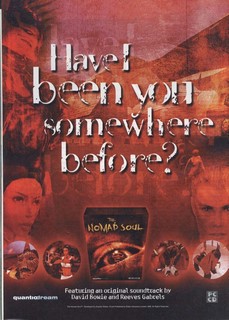
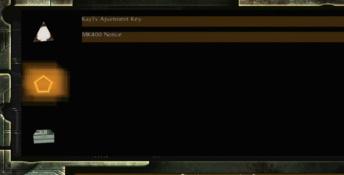
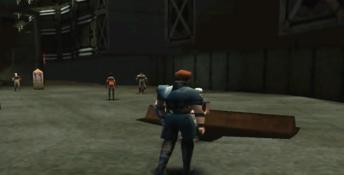
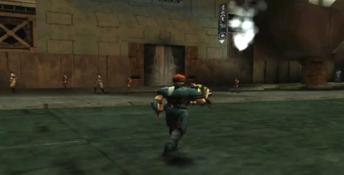
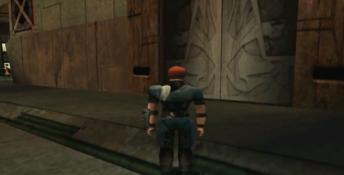
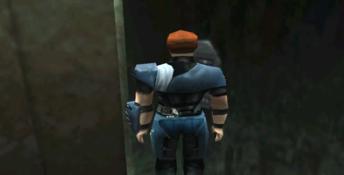
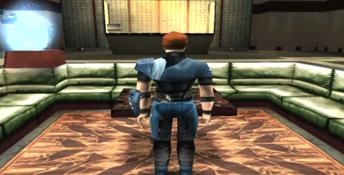
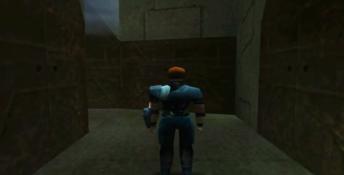
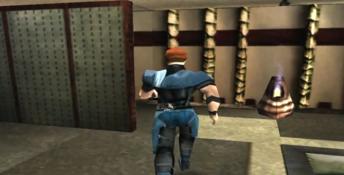
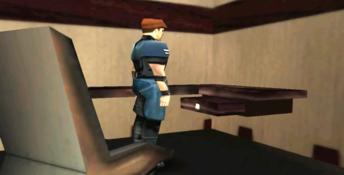
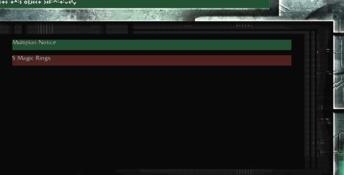
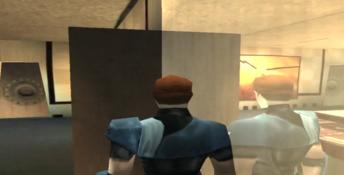
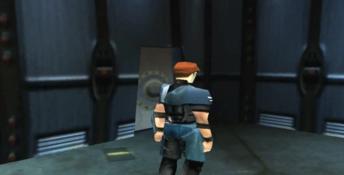
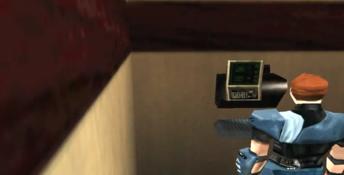
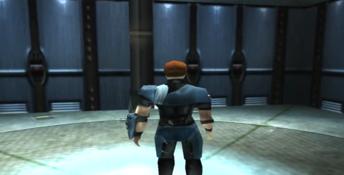
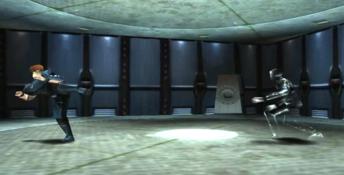
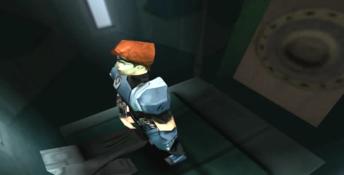
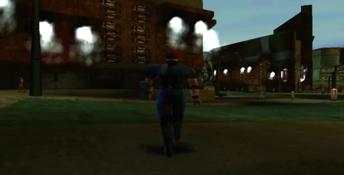
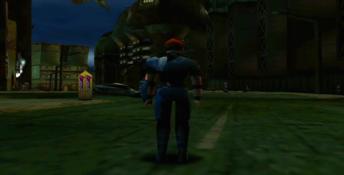
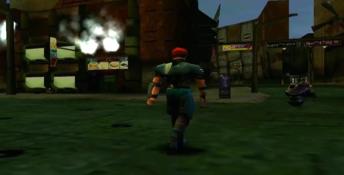
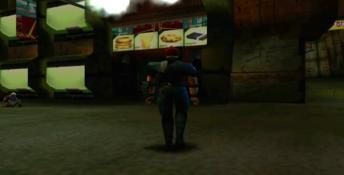
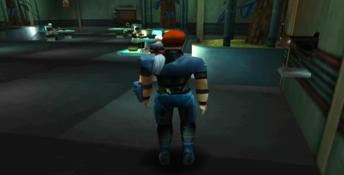
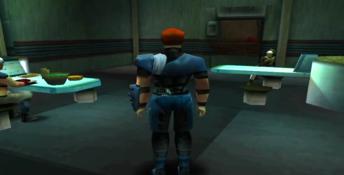
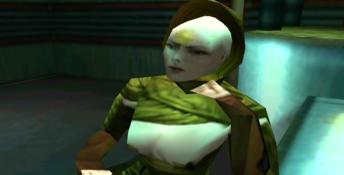
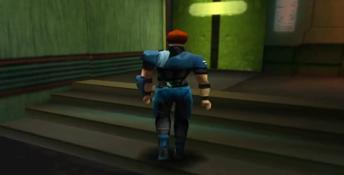
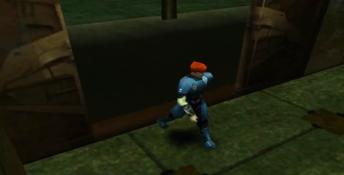
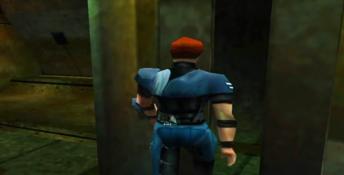
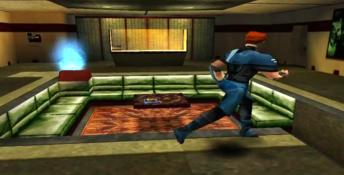
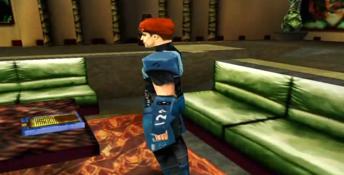
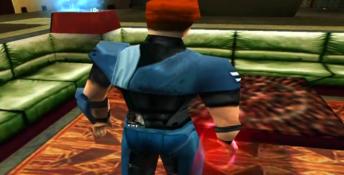
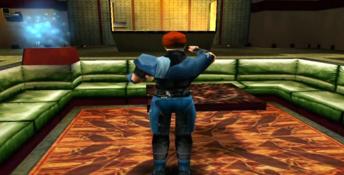
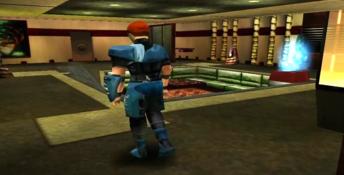
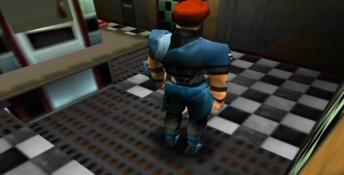
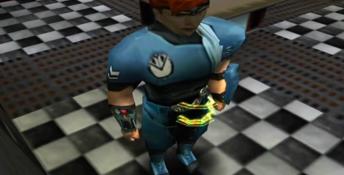
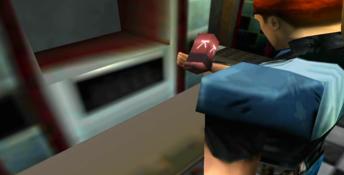
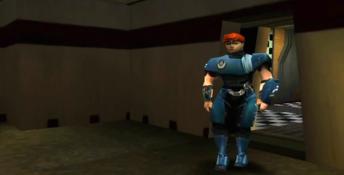
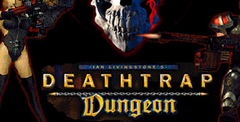 Deathtrap Dungeon
Deathtrap Dungeon
 Evolva
Evolva
 Fur Fighters
Fur Fighters Проект Бродяги
Проект Бродяги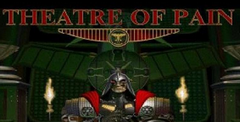 Theatre of Pain
Theatre of Pain
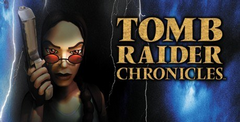 Tomb Raider: Chronicles
Tomb Raider: Chronicles